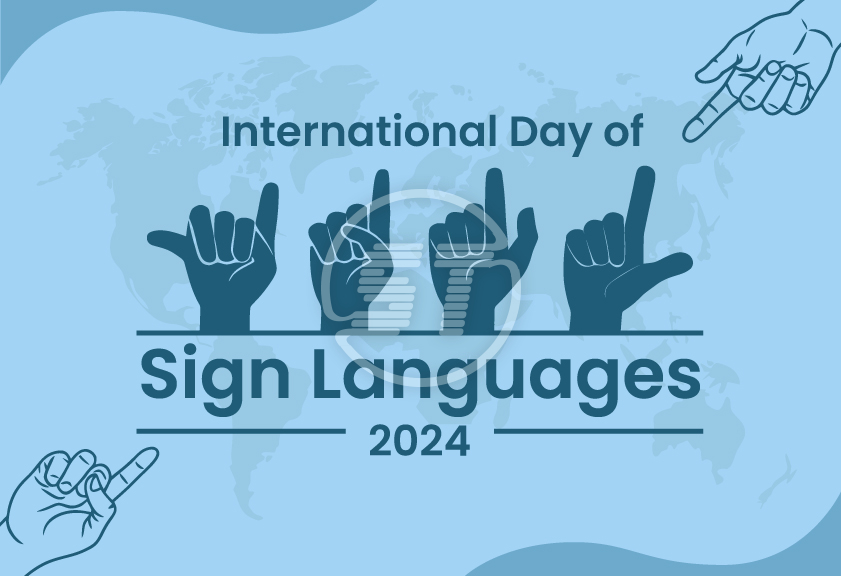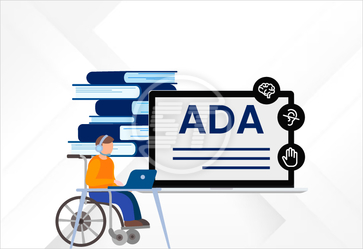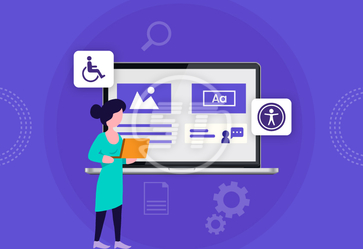The International Day of Sign Languages is observed annually on September 23rd, a momentous occasion for the global deaf community. This day celebrates the importance of sign language in achieving the full realization of human rights for deaf people. Over time, technology has taken over the world and thus, such events play a critical role in bridging communication gaps and inclusivity.
Background of International Day of Sign Languages!
The United Nations Resolution A/RES/72/161 recognizes September 23rd as the International Day of Sign Languages, inspired from there only this celebration began in 2017.
The proposal was given by the World Federation of the Deaf (WFD). It is a federation of 135 national associations of deaf people, representing more than 70 million deaf individuals worldwide.
Also, September 23rd is the establishment date of the WFD and thus, they chose this date to celebrate as Sign Languages Day . The WFD is an advocacy organization that aims to protect the Deaf culture and rights of deaf people.
Gradually, the day is taking over the world and people are now celebrating this day with enthusiasm to support sign languages and the deaf community.
Sign languages and the role of digital technology in this event!
Sign languages are fully-fledged natural languages, structurally distinct from spoken languages. They are vital for the cognitive, social, and emotional development of deaf individuals. Recognizing sign languages as equal to spoken languages is crucial for ensuring the deaf community has access to education, employment, and public services.
It is evident that technology plays an essential role in making communication more accessible. For the deaf community, it means utilizing digital tools and platforms that support sign language and other visual forms of communication. Let’s understand:
Video Relay Services (VRS)
These services allow deaf individuals to communicate via video call, where a sign language interpreter facilitates the conversation between the deaf user and the hearing party. This service has revolutionized personal and professional communication for many deaf individuals.
Sign language avatars
Advances in artificial intelligence have led to the development of sign language avatars, which can translate written or spoken text into sign language. These avatars are especially useful in providing accessible content with sign language on websites and mobile apps.
Captioning and subtitling
Automated captioning services on platforms like YouTube, Zoom, and other social media channels have significantly improved access to information. Real-time transcription services ensure that deaf and hard-of-hearing individuals can participate fully in live events, webinars, and meetings.
Education tools
Online learning platforms are increasingly incorporating sign language interpreters and captioning to make educational content accessible. Apps designed for learning sign languages are also becoming more prevalent, providing valuable resources for deaf individuals and their families, friends, and others.
Challenges encountered by deaf individuals and the way forward!
Despite these advancements, significant challenges remain in achieving comprehensive digital accessibility. Many digital platforms still lack robust accessibility features, and there is a need for greater awareness and advocacy to ensure that the rights of the deaf community are upheld.
Standardization and quality control
Standardized high-quality sign language interpretation and captioning services across all digital platforms are highly required. Inconsistent or poor-quality services can lead to misunderstandings and exclusion.
Affordability and availability
Many advanced digital accessibility tools are expensive and not widely available. Ensuring that these tools are accessible to all, regardless of socio-economic status, is crucial.
Awareness and training
There is a need for greater awareness of the importance of digital accessibility among web developers, content creators, businesses, and the public. Training programs for developers and others on creating accessible digital content can help bridge this gap.
Libras is a part of All in One Accessibility!
Libras, or Brazilian Sign Language, is the primary sign language used by the deaf community in Brazil. Recognized officially by Brazilian law in 2002, Libras has its own distinct grammar and lexicon, differing significantly from spoken Portuguese. It incorporates a combination of hand shapes, movements, facial expressions, and body language to convey meaning.
Libras plays a crucial role in the cultural and social lives of deaf Brazilians, providing them with a means of communication that is both expressive and efficient. Efforts to promote and teach Libras in schools and public institutions have been growing, aiming to foster greater inclusion and accessibility for the deaf community in Brazil and other parts of the world. Thereby our All in One Accessibility widget fully supports Libras to make it easier for those individuals to access digital information and communicate successfully.
In a nutshell,
The theme of the International Day of Sign Languages 2024 (Advanced digital accessibility for the deaf community) underscores the transformative potential of digital technology in advancing accessibility for the deaf community.
By leveraging technological innovations and advocating for inclusive practices, we can ensure that deaf individuals have equal opportunities to participate fully. This day serves as a reminder of the ongoing efforts needed to create a world where everyone, regardless of their hearing ability, can communicate, learn, and thrive.
As we support the International Day of Sign Languages, let us commit to advancing digital accessibility and inclusivity, paving the way for a more equitable and inclusive future for all. At Skynet Technologies, we are providing complete digital accessibility solution including accessibility audit, remediation, PDF and document accessibility, training, ongoing monitoring, VPAT/ACR, and support to make and improve website accessibility.


